Rural Rabble Rousing
Air Date: Week of March 19, 2010
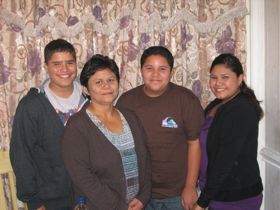
Pesticide organizer Teresa DeAnda with three of her children. (Photo: Devin Robins)
Much of inland California is rural and poor, a sharp contrast with hip, upscale coastal life. Residents in the rural regions sometimes live with a high degree of pollution. Producer Devin Robins visited three women who became activists over concerns for their communities’ health.
Transcript
YOUNG: It’s Living on Earth, I’m Jeff Young. California’s Central Valley includes the fourth poorest Congressional district in the country. It’s a region where towns are small, streets are often unpaved, and modest homes sit beside busy agricultural fields. It's also a region beset by environmental problems. That, in turn, has given rise to environmental organizing. Producer Devin Robins spent time with some Central Valley mothers to learn about their work for healthier communities in hardscrabble country.
[SOUNDS OF HIGHWAY TRAFFIC]
ROBINS: Off a dusty portion of Highway 99, a green sign reads “Earlimart: Population 7,000.” The town earned its name almost a century ago because crops like grapes, potatoes and nuts could be harvested early here. 51-year-old Teresa DeAnda grew up across the street from the fields where both her parents worked. She learned about pesticides young.
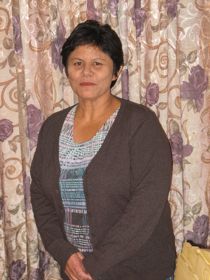
Teresa DeAnda founded El Comite Para El Bienestar de Earlimart. (Photo: Devin Robins)
ROBINS: Hazardous pesticides such as Endosulfan and Dursban, which is banned for use in homes, are commonly used in the fields across the street from Earlimart. Diesel exhaust from trucks and tractors is also prevalent. As a mother, DeAnda saw a blasé acceptance developing in her children.
DEANDA: My daughter Tina when she saw a little girl she said, "Oh, that’s Mirabelle and she has three fingers because of the pesticides," and I said, "She has three fingers?" and she said, "Yeah, and she knows it’s from the pesticides.”
ROBINS: Then in 1999, there was an incident that left an even deeper mark.
DEANDA: They were spraying across the street and the spray was inside my house. It was full of spray in here; it was foggy in my house. I didn’t know if my kids were going to wake up, my husband was out of town. It was just a horrible helpless feeling.
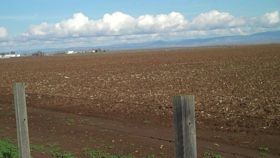
In Earlimart and other Central Valley towns, there’s little border between field and neighborhood. (Photo: Devin Robins)
DEANDA: So many of these people when we go there will tell us, “Oh yeah we had a barbeque last weekend and they were spraying right next to us and my kids were feeling sick after that and a bunch of us got headaches.” If you come here in May, June or July they are spraying heavy and you can smell it. You’ll smell the odor of pesticides.
ROBINS: DeAnda formed The Committee for the Well-Being of Earlimart. Now she’s known for taking busloads of people to Sacramento so legislators can see the faces and hear the stories of the victims of pesticide drift up close and personal. The group helped pass pesticide legislation in California and persuade the county to limit aerial spraying.
[SOUNDS OF KIDS PLAYING OUTSIDE, DOGS BARKING, SKATEBOARDING]
ROBINS: About an hour northwest is Kettleman City. Fifteen hundred primarily Latino residents live here.
They have to drive 30 miles to the nearest grocery store. Although it might seem hard to organize in a place where people have to try so hard to get by, Kettleman City is home to a multi-generational environmental justice movement.
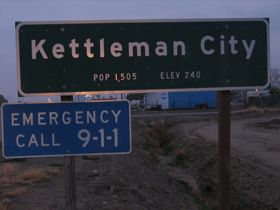
(Photo: Devin Robins)
ROBINS: For 20 years, Maricela Mares-Alatorre and her family have been a thorn in the side of a hazardous waste landfill about three and a half miles south of town.
More community members joined their fight after several babies were born with cleft palates here. Authorities say there may be as many as nine. Three of the babies died.
MARES-ALATORRE: And a lot of the moms we work with that have had the cleft palette children they tell us, "You know what we used to think you were crazy, but now I am so angry and I want them to hear me and I want them to listen, and they don’t," and I say “Well, welcome to the fight.”
ROBINS: Alatorre says her strength comes from both her parents. Her father worked with Caesar Chavez. In fact this region is the birthplace of the United Farm Workers movement. Her mother, Mary Lou, is a teacher and created the group “People for Clean Air and Water” in the 1980s. Despite this legacy, Alatorre says the work, and its repercussions, do take a toll.
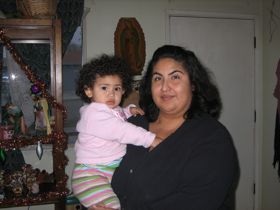
Maricela Mares-Alatorre wants more research into the possible environmental causes of several birth deformities near Kettleman City recently. (Photo: Devin Robins)
ROBINS: Her 15-year-old son Miguel Alatorre responded by getting involved in the movement himself. He leads a local youth organization called Kids Protecting Our Planet. Here’s Miguel on the steps of the EPA in San Francisco, demanding that officials address Kettleman City’s environmental concerns:
ALATORRE: As you can see we have all our youth right here. We’re not going to stand for any of their trash anymore and we’re going to fight back. Qué queremos?!
[CROWD CHANTS BACK]
ROBINS: Some of the Alatorres' neighbors vigorously disagree with their efforts, pointing to Little League sponsorships and money for local schools the waste facility provides. So Maricela’s activism means continuing discord and her opponents criticism is increasingly pointed.
ALATORRE: You can’t say anything; if you say oh they chose Kettleman City because it’s a Latino community – oh, you’re playing the race card. If we say they chose Kettleman city because it’s an impoverished community because people don’t have the means to fight back. Oh, you’re playing the poverty card.
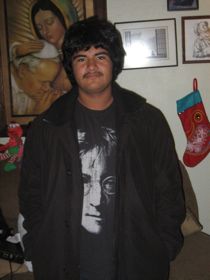
Fifteen-year old Miguel Alatorre was once taunted by a gym teacher for his family's organizing. (Photo: Devin Robins)
ROBINS: Last month, the cleft palette birth defects in Kettleman City drew national attention. The media exposure prompted visits from state officials and the top EPA chief in the region. They promised more scientific research.
[SOUNDS OF BOUNCING BALL]
KELLY: Juggle the ball with your feet here. Pull it back with your toe and then juggle it with your feet.
ROBINS: In a third town two hours north, 13-year-old Ellen Kelly shows me her soccer moves. You'd never know Ellen was born with diminished lung capacity. About five years ago, when she was in the 3rd grade her mother Melissa was actually teaching in her school when Ellen left PE and ran to her.
KELLY-ORTEGA: She came into my classroom white as a ghost saying my heart hurts, my heart hurts, and not knowing very much at the time I thought she was having a heart attack and as a mother you just kind of freak out. And I rushed her to the doctor and the doctor said, “It’s not a heart attack. It was an asthma attack.”
ROBINS: Melissa Kelly-Ortega says she never thought much about the air until Ellen’s asthma attack. Then her youngest daughter Satia was born with breathing problems. Ortega soon began to notice on days with poor air quality, kids had more migraines, asthma attacks, and other health problems. She decided to get involved and started organizing.
KELLY-ORTEGA: I think that I would call myself an activist. I think other people would call me a radical and that becomes a very hard place to be because when you’re a radical people don’t listen.

Melissa Kelly-Ortega educated herself about air contamination after her daughter Ellen was hospitalized with an asthma attack and her younger daughter was born with breathing issues. (Photo: Devin Robins)
ROBINS: What Ortega would like you to hear is that the Central Valley, including Merced consistently ranks among the top ten most polluted regions in the U.S.
Studies show that's a result of diesel exhaust and dirty air blown in from the Bay Area and Los Angeles. Combine with that agricultural burning. It all adds up to a soup of lung-scarring ozone and particles that cause asthma attacks.
KELLY-ORTEGA: I think one of the, maybe the tragedy of living in the Valley is that we have just become sort of numb. We see this way of living that this is the only way to live. And I think someone had asked, “why don’t you move?” You need resources to move, you need to be able to pick up your family and take them away from their friends, and you need to be able to buy a house somewhere the air is clean, and that’s just not something we have.
ROBINS: Nevertheless Ortega says she feels hopeful about the future. In 2008, the county agreed to use colored flags on city buildings to let residents know if the air quality is safe or not. Also, beginning next year, the state will require truck owners to install diesel exhaust filters on their rigs. Melissa Kelly Ortega has seen changes that people told her would never come to pass. And so she in Merced, Maricela Mares Alatorre in Kettleman City, and Teresa DeAnda in Earlimart raise their children and grandchildren in the Central Valley, and work for a day when it's a healthier place to live. For Living On Earth, I'm Devin Robins in Merced, California.
Living on Earth wants to hear from you!
Living on Earth
62 Calef Highway, Suite 212
Lee, NH 03861
Telephone: 617-287-4121
E-mail: comments@loe.org
Newsletter [Click here]
Donate to Living on Earth!
Living on Earth is an independent media program and relies entirely on contributions from listeners and institutions supporting public service. Please donate now to preserve an independent environmental voice.
NewsletterLiving on Earth offers a weekly delivery of the show's rundown to your mailbox. Sign up for our newsletter today!
 Sailors For The Sea: Be the change you want to sea.
Sailors For The Sea: Be the change you want to sea.
 The Grantham Foundation for the Protection of the Environment: Committed to protecting and improving the health of the global environment.
The Grantham Foundation for the Protection of the Environment: Committed to protecting and improving the health of the global environment.
 Contribute to Living on Earth and receive, as our gift to you, an archival print of one of Mark Seth Lender's extraordinary wildlife photographs. Follow the link to see Mark's current collection of photographs.
Contribute to Living on Earth and receive, as our gift to you, an archival print of one of Mark Seth Lender's extraordinary wildlife photographs. Follow the link to see Mark's current collection of photographs.
 Buy a signed copy of Mark Seth Lender's book Smeagull the Seagull & support Living on Earth
Buy a signed copy of Mark Seth Lender's book Smeagull the Seagull & support Living on Earth

